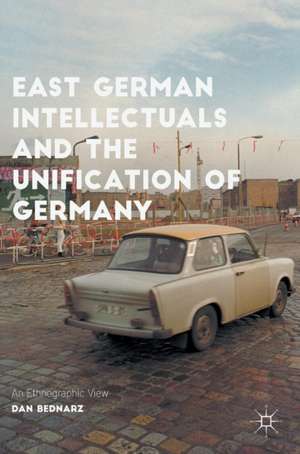East German Intellectuals and the Unification of Germany: An Ethnographic View
Autor Dan Bednarzen Limba Engleză Hardback – 10 ian 2017
| Toate formatele și edițiile | Preț | Express |
|---|---|---|
| Paperback (1) | 484.47 lei 6-8 săpt. | |
| Springer International Publishing – 7 iul 2018 | 484.47 lei 6-8 săpt. | |
| Hardback (1) | 585.90 lei 6-8 săpt. | |
| Springer International Publishing – 10 ian 2017 | 585.90 lei 6-8 săpt. |
Preț: 585.90 lei
Preț vechi: 689.29 lei
-15% Nou
Puncte Express: 879
Preț estimativ în valută:
112.13€ • 115.68$ • 94.90£
112.13€ • 115.68$ • 94.90£
Carte tipărită la comandă
Livrare economică 05-19 martie
Preluare comenzi: 021 569.72.76
Specificații
ISBN-13: 9783319429502
ISBN-10: 3319429507
Pagini: 280
Ilustrații: XI, 269 p.
Dimensiuni: 148 x 210 x 21 mm
Greutate: 0.47 kg
Ediția:1st ed. 2017
Editura: Springer International Publishing
Colecția Palgrave Macmillan
Locul publicării:Cham, Switzerland
ISBN-10: 3319429507
Pagini: 280
Ilustrații: XI, 269 p.
Dimensiuni: 148 x 210 x 21 mm
Greutate: 0.47 kg
Ediția:1st ed. 2017
Editura: Springer International Publishing
Colecția Palgrave Macmillan
Locul publicării:Cham, Switzerland
Cuprins
Preface.- Introduction.- Part I: After The Turn, 1990-91.- Part II: Quarter Century Later Follow-up, 2014.- Part III: Sociological Interpretations.- Epilogue.
Notă biografică
Dan Bednarz is Assistant Professor at Bristol Community College, USA. Bednarz has done research on organizational responses to decline, including how New York City mental health centers adapted to that city’s 1970s fiscal crisis, and how public health systems responded to cutbacks in state and local funding during and after the 2008 financial and economic crash.
Textul de pe ultima copertă
This book discusses the reunification of Germany and the negative impacts that this had on East German intellectuals. The book is an ethnographic account of how the intellectuals of East Germany reacted to the demise of their nation, their “dream” of a socialist world, and unification with capitalist West Germany. Part I covers unification, 1990-91; Part II presents a quarter century later follow-up with one-fourth of those interviewed in 1990-91; and Part III examines the case from three social science perspectives.
Caracteristici
Looks at the unification of Germany from the side of the GDR intelligentsia Provides a sociological ethnography account looking at collective memory of the time Challenges traditional wisdom and provides a four-conceptual point of view


















